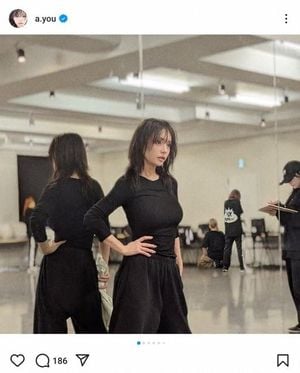In the fast-paced world of social media and celebrity, few names resonate as loudly as that of Jimmy Donaldson, better known as MrBeast. The YouTube star, renowned for his grand stunts and philanthropic endeavors, is now embroiled in a deeply troubling scandal involving allegations against one of his long-time collaborators, Ava Kris Tyson.
Tyson, who has been a prominent figure on the MrBeast channel for nearly a decade, faced accusations of sending inappropriate messages to a young fan when she was just 20 years old. In light of these serious claims, which first surfaced last month, she has announced her decision to withdraw from all involvement with MrBeast and social media altogether.
Earlier this week, the allegations gained traction after a video by YouTuber Adrox garnered over a million views, reigniting scrutiny over Tyson's past interactions with an individual known online as LavaGS—a fan who was only 13 at the time of the purported communications. While Tyson has steadfastly denied any wrongdoing, claiming that their exchanges were merely “edgy jokes,” LavaGS publicly defended her, insisting that no harm was done and describing the narratives surrounding their relationship as “massive lies.”
Amid the swirling controversies, MrBeast issued a statement expressing his disgust over the situation. He stated, “I do not condone or support any of the inappropriate actions,” emphasizing that he has engaged an independent third-party investigator to examine the allegations comprehensively. The YouTuber stressed the importance of verifying the details surrounding the claims before proceeding with any further actions.
This incident is particularly contentious given Tyson's recent transition and the ensuing social media backlash regarding her identity. Following her announcement of hormone replacement therapy last year, Tyson has faced significant harassment, prompting both her and MrBeast to speak out against the transphobic attacks directed towards her.
In her resignation letter, Tyson wrote on social media, "I humbly apologize for anyone I have hurt with my unacceptable social media posts, past actions, and to those who may feel betrayed by how I used to act online. It was not my intent.” These comments signal her intention to focus on her mental health and personal wellbeing amidst the storm of public scrutiny.
This situation unfolds against the backdrop of MrBeast's extraordinary rise to fame. With over 300 million subscribers, he holds the title of the most-subscribed YouTuber, and his videos often feature generously funded challenges and charitable donations—a depiction of youthful exuberance and goodwill. The contrast between his public persona and the troubling allegations against a close associate raises significant questions about accountability within the realm of digital fame.
In an era where content creators wield considerable influence over impressionable young audiences, the boundaries of interaction between creators and fans are constantly evolving. Prominent YouTubers, including Valkyrae and Pokimane, have voiced their discontent with the situation, reiterating the importance of safeguarding minors from potentially predatory behavior. Valkyrae characterized the events as “disappointing and disgusting,” while Pokimane underlined that inappropriate behavior toward minors is unacceptable, regardless of the individual's stature in the entertainment world.
As investigations continue, the ramifications of this scandal may extend beyond Tyson's personal career, potentially impacting MrBeast's brand image as well. While he has historically been resilient in the face of controversies, this particular situation invites deeper reflection on the responsibilities that come with platform and influence.
It remains to be seen how both parties will navigate the challenges ahead. With investigators examining the circumstances detailed in public forums, the outcomes of these investigations could radically alter their careers. As the digital spotlight shines brightly on them, the balance between public persona and private actions is under intense scrutiny, and the consequences could reverberate far beyond simple likes and views.
The evolving nature of social media culture forces both creators and audiences alike to confront uncomfortable truths. In this whirlwind of discussions about power dynamics, privacy, and responsibility, the ultimate question arises: how can boundaries be established in an environment that thrives on engagement and connection? As this story develops, it offers a crucial opportunity to reconsider the very foundations upon which creator-audience relationships are built.



